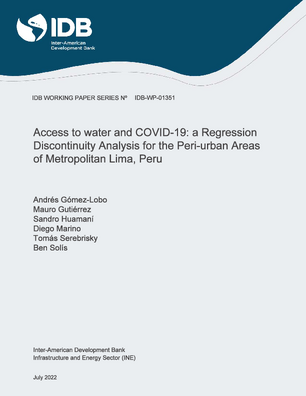Access to water and COVID-19: a regression discontinuity analysis for the peri-urban areas of Metropolitan Lima, Peru
Date
Sep 2022
This paper presents the results of a quasi-experimental study for which information was collected through a survey conducted in peri-urban areas of Metropolitan Lima between October and November 2021. The survey was conducted on households residing near and on both sides of the border of coverage of the public water network. Our work finds that access to networked water was associated with a reduction in the probability of infection by COVID-19. Likewise, an extension to the model, using heterogeneous effects, suggests that it is not enough for a home to be connected to the network, but that a minimum amount of consumption must also be guaranteed. The results should be interpreted taking into consideration the limitations in the information. These results highlight the need for investment in infrastructure to close access gaps, and the importance of ensuring quality and affordable services for the population.




